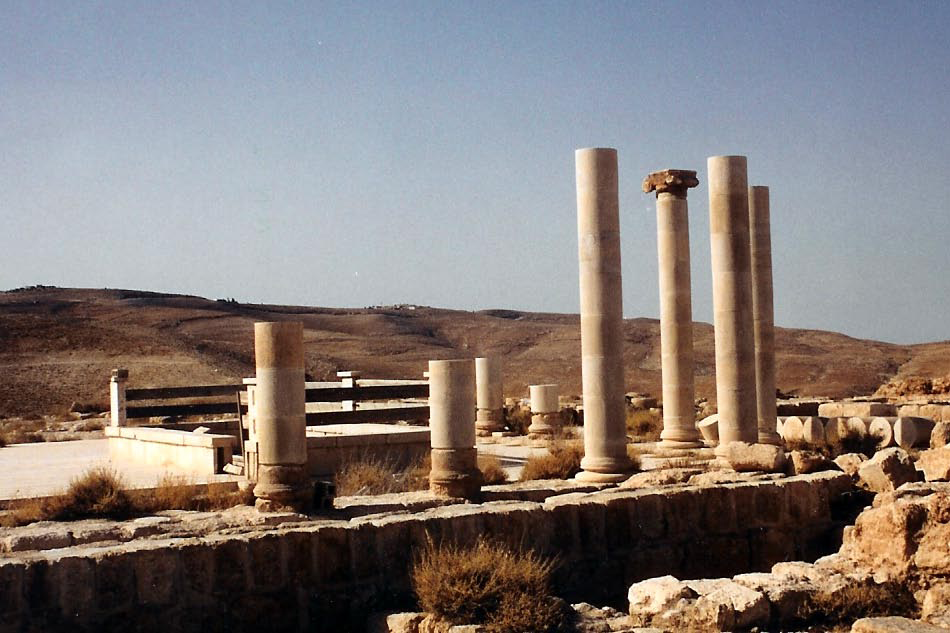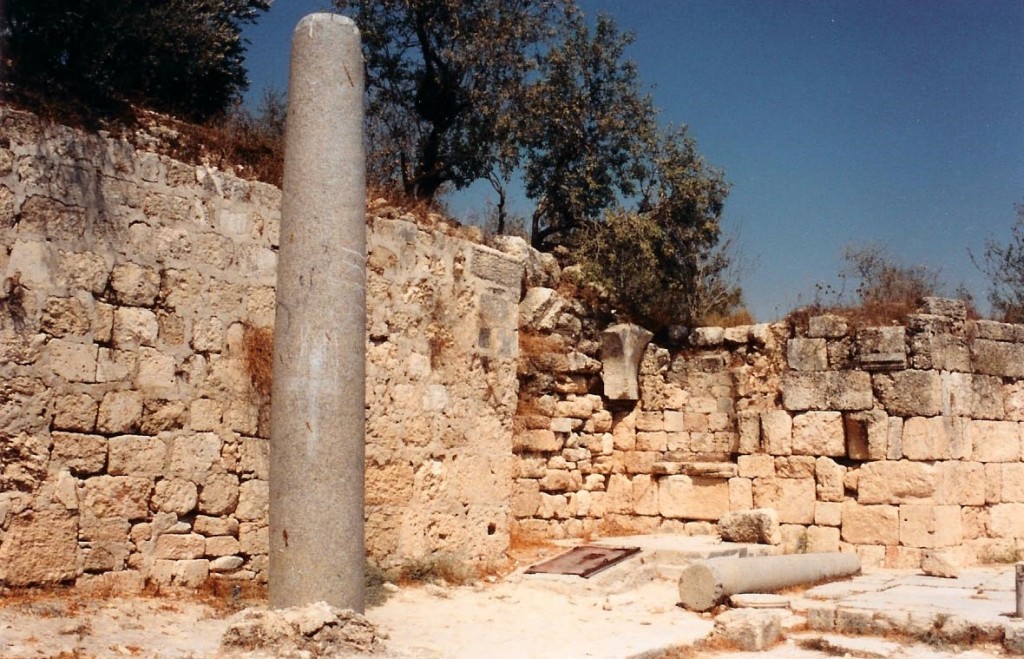10.01.11 Mk. 6:17-29 (See also Mt. 14:3-12a)
DEATH OF JOHN THE BAPTIST
17 For Herod himself had given orders to arrest John and to chain him in prison on account of Herodias, his brother Philip’s wife, whom he had married. 18 John had been telling Herod, “It is not lawful for you to have your brother’s wife!” 19 So Herodias held a grudge against him and wanted to kill him. But she could not, 20 because Herod was in awe of John and was protecting him, knowing he was a righteous and holy man. When Herod heard him he would be very disturbed, yet would hear him gladly.
21 Now an opportune time came on his birthday, when Herod gave a banquet for his nobles, military commanders, and the leading men of Galilee. 22 When Herodias’s own daughter came in and danced, she pleased Herod and his guests. The king said to the girl, “Ask me whatever you want, and I’ll give it to you.” 23 So he swore oaths to her: “Whatever you ask me I will give you, up to half my kingdom.”
24 Then she went out and said to her mother, “What should I ask for?”
“John the Baptist’s head!” she said.
25 Immediately she hurried to the king and said, “I want you to give me John the Baptist’s head on a platter — right now!”
26 Though the king was deeply distressed, because of his oaths and the guests he did not want to refuse her. 27 The king immediately sent for an executioner and commanded him to bring John’s head. So he went and beheaded him in prison, 28 brought his head on a platter, and gave it to the girl. Then the girl gave it to her mother.
29 When his disciples heard about it, they came and removed his corpse and placed it in a tomb.
In the meantime, Herod not only constantly appeased his Roman overlords, but he also tried to outperform them in every manner possible. His parties were the talk of the empire, and it was often said that if one did not attend one of Herod’s galas, one has never attended a true party. Therefore, when Herod Antipas was enjoying his birthday party, Herodias and her daughter Salome planned their revenge for what John had said.
“Herod himself had given orders to arrest John.” Herod Antipas had John the Baptist arrested because the Baptist gave a scathing rebuke on his marriage with Herodias, especially since Herodias was previously married to his half-brother Philip.[1] In addition, since John was immensely popular, Herod feared that the itinerant preacher might stir the people to revolt. This was a serious threat since there were 13 revolts from the time the Romans arrived in 63 B.C. until the so-called “First Revolt” of A.D. 66-70.[2]
“Wanted to kill him.” In today’s speech it could be said that Herodias literally “had it in for him,” and in the worst way possible. He was to be killed for personal reasons, although according to Josephus, the public charges were for political reasons. She carefully schemed his death just as Jezebel once had opposed Elijah.[3] Note the following similarities between Jezebel and Herodias, outlined in Hebraic style:
- John ministered with the image of Elijah the prophet and had a unique ministry to prepare the people of God for the coming of their Lord.
Just as Elijah had a unique ministry, demonstrating the power of God.
- A woman named Jezebel, however, terrorized Elijah, and
A woman named Herodias confronted the Baptist.
- Jezebel was the wife of the pagan Sidonian King Ahab (1 Kg. 16:31) and
Herodias was the wife of pagan King Herod Antipas.
- Jezebel promoted Baal worship (1 Kg. 16:32-33), opposed Elijah (1 Kg. 19:1-2), and killed the prophets of the Lord (1 Kg. 18:4, 13).
Herodias, as the queen of the royal court, would have promoted the king’s religion; she opposed John the Baptist and eventually succeeded in his martyrdom.
- John the Baptist ministered with the Spirit of Elijah, but was opposed by the spirit of Jezebel.
“Opportune time.” The phrase in the Greek is eukairos (2121) meaning well-timed, and signifies ideal timely opportunity, and convenient.[4] The statement suggests that if the birthday banquet had not occurred at this time, John the Baptist may not have lost his life.
“On his birthday, when Herod (Antipas) gave a banquet.” The royal families celebrated birthdays, dates of ascension, and anniversaries with festivals and great fanfare. For example, the Egyptian pharaoh celebrated his birthday with a feast for his royal court (Gen. 40:20) and the Persian King Xerxes had a banquet for his nobles (Esther 1:1-8) while his Queen Vashti had a similar banquet for her court (Esther 1:9), possibly for the third anniversary of Xerxes’ reign (Esther 1:3). As grand as these royal banquets were, parties and banquets hosted by the Herodian family were so superior to others that they won the envy of Rome.
These became so well known that Aulus Persius Flaccus (A.D. 34 – 62), a Roman satirist commonly referred to as Persius, described the extravagance of Herod’s birthday festivals that became known as “the days of Herod.” While some scholars believe he referred to Herod’s accession day, most agree the writer referred to the famed birthday parties which were popular with both the Greeks and the Hellenized Jews. Persius was loved by the popular crowds because he degraded and mocked the aristocrats.[5] Notice his cunning and insulting words about Herod Antipas:
Or when the days of Herod the Jew are here, and the lamps, wreathed with violets, set in the greasy window, vomit oily vapour, and the tunny fish tail swims, encircling the red bowl, when the white jug brims with wine, and you move your lips silently, grown pale at the Sabbath of the circumcised.
Persius, Satire 5:180-184
He highly criticized the extravagance and abuses of his contemporaries, and even called Herod a Jew, which was an insult to both the Jews and to the Herodians. Needless to say, the aristocrats of Roman had no great love for him. It was one of these extravagant celebrations that caused the demise of the Baptist preacher. It was said that the Herods had perfected the art of entertainment and it was an honor to have been invited to any of their events. They represented the ultimate in Hellenistic materialism, hedonistic pleasures, and philosophy.[6]

“Nobles, military commanders.” To insure loyalty of subordinates and impress the rich and powerful, Antipas invited nobles, who were the chief men, and military commanders, who were the commanders of thousands, to a festive birthday gala.[7]
“Herodias’s own daughter came in and danced.” Normally, royalty employed professional dancers who were known for their sensuality and seductiveness. But this time everyone was in for an unexpected surprise. As the birthday banquet was under way, Herodias had her daughter Salome dress in the most seductive wardrobe of the palace. At such parties, music began quietly but soon heightened into a frenzied pitch as dancers in scant clothing danced between the attendees. The sensual dancing performed by the Greeks and Romans was without any moral or religious values. This was in sharp contrast to the dancing style of the Jews, a type of religious folk art and an expression of worship of God. Jewish focus was on God with no hint of sexuality.
In the Herodian family, however, belly dancing was the beginning of the licentious and sexual performance that thrilled Herod and his guests greatly. Typically, the lead dancer, in this case Salome, danced The Dance of Eros, in which one piece of translucent silk clothing was removed after another. When she was finished, all she wore was a small piece to the applause of the drunken crowd. In the minds of the drunken guests, this was the best performance they had undoubtedly ever witnessed, so the offer was made by Herod to give Salome whatever she wanted, up to half of his kingdom. Clearly, he was intoxicated even to consider giving her half of his kingdom, yet he had to stand by his word.
Herodias anticipated that in this context, her lustful husband would offer Salome anything she wanted, and that is precisely what happened. He offered her anything, up to half of his kingdom. Little did he realize what the request would be. Because John the Baptist had accused Herodias and Herod of adultery, even though they were not Jews but Romans, Herodias was determined to have the prophet killed.

“Up to half my kingdom.” This is a figure of speech indicating immense generosity and was never taken literally. The Persian King Xerxes (Esther 5:3, 6) used the same expression. There is no record of any king ever giving up half of his reign as the result of such an offer, but kings did at times become extremely generous to favored subjects.
“Because of his oaths.” The translation is accurate – “because of his oaths” – the Greek clearly states that Herod, in his mad excitement, confirmed his promise with repeated oaths. These were actions he would surely regret.[8] However, Herod Antipas was king and as such, some scholars believe he could have denied the request.[9] They cite a passage of the Mishnah as the reason.[10] Even though that is a Jewish book and Herod was of mixed Arab blood, the Jewish writing reflects a common practice in most if not all Middle Eastern cultures of the time.
It should be noted that this marital arrangement concerning Herodias and Herod Antipas was typical for the Herodian family. In another case, his brother Archelaus also divorced his wife Mariamne to marry Glaphyra, the widow of his half-brother Alexander. However, a few days after the wedding, she died.[11] By the end of the first century, divine judgment wiped out the entire Herodian dynasty.
The death of John the Baptist was indicative that, Jesus likewise, would be killed. Just as John’s message was rejected, so was the message of Jesus. Throughout the life of Jesus, there are numerous indicators that He would be rejected. Finally, it is an irony of history and a work of the grace of God, that Manaen, a close friend of Herod Antipas, became one of the prophets and teachers in the church at Antioch (Acts 13:1).
10.01.11.Q1 What is the mystery of John the Baptist?
The mystery of John the Baptist is, “What happened to his body?” Where was he buried” The traditions are interesting and, admittedly, of no theological value. But these are interesting as the Middle East is full of traditions.
- One tradition says that he was buried in Samaria. However, moving his body from the Machaerus to Samaria would have taken three days, when the custom was that a body be buried the same day of death. The transport of the body was possible, but highly unlikely. Furthermore, why in Samaria? No orthodox Jew ever wanted to be buried in Samaria, and no Jew would have permitted a friend or relative to be buried there as well.
- Another tradition says that only John’s body was buried in Samaria, but his head was taken further northeast to Damascus where it was placed in the Church of St. John the Baptist – later known as the Mosque of John the Baptist.
- But another tradition claims that the Russian Orthodox Church in Jerusalem has his head.
Finally, some scholars have suggested that this act of beheading John was too violent for the times. History, however, suggests that it was typical of ancient monarchs. Three examples are as follows:
- The fifth century B.C. Greek historian Herodotus recorded the demand made by Amestris, the wife of King Xerxes, at his birthday festival. She demanded that the wife of Masistes die, as she was incredibly jealous of her. Xerxes put her to death.[12]
- In another case, in 53 B.C. the Parthian King Orodes enjoyed both a victorious battle of Karrha and the marriage of his son Pacorus. In the festive celebration, an actor brought on stage the half-wasted head of King Crassus, who lost the battle.[13]
- Finally, Rome was no less violent and savage. Emperors Nero and Caligula both had men tortured for the entertainment of guests at various feasts. Caligula had swordsmen demonstrate their skills of beheading prisoners and Nero burned Christians at night to illuminate his court.
The great work of John the Baptizer was over. Just as Samuel had centuries earlier presented and consecrated King David, so the last prophet presented and consecrated the Greater King. John was a beloved son and so was Jesus. Just as John was rejected and died a martyr, so would Jesus. No one knows what happened to the prophet who came as Elijah. The proverbial “bottom line” is that the true location of his grave is known only to God.
10.01.11.Q2 What political and military ramifications resulted from the divorce actions of Herod Antipas?
Not only did God send an incredible punishment upon Herod Antipas, but everyone recognized it.
Josephus recorded a summary of the marriage of Antipas to the daughter of the Nabataean king Aretas, and the divorce that followed several years later (after he fell in love with Herodias). Since there were already some conflicting issues between Herod Antipas and Aretas, the divorce was the deciding factor for Aretas to go to war. Josephus wrote the following:
About this time Aretas (the Nabataean king of Arabia, Petra) and Herod (Antipas) had a quarrel on the account following: Herod the tetrarch had married the daughter of Aretas (a Nabataean king), and had lived with her a great while. But once he was in Rome he lodged with Herod (Philip), who was his brother indeed, but not by the same mother, for this Herod was the son of the high priest Simon’s daughter. However, he fell in love with Herodias, the last Herod’s wife, who was the daughter of Aristobulus their brother, and the sister of Agrippa the Great. This man ventured to talk to her about marriage between them, which she accepted, an agreement was made for her to change her habitation and come to him as soon as he should return from Rome. One article of this marriage also was this, that he should divorce Aretas’s daughter . . .
Accordingly Herod sent his wife away, as thinking she had not perceived anything. Now she had sent a good while before to Machaerus (Fortress), which was subject to her father, and so all things necessary for her journey were made ready for her by the general of Aretas’s army. And by that means she soon came to Arabia under the conduct of the several generals who carried her from one to another successively. And soon she came to her father and told him of Herod’s intentions. So Aretas made this the first occasion of his enmity between him and Herod who had also some quarrel about the limits (of their land) at the country of Gamalitis. So they raised armies on both sides and prepared for war, and sent their generals to fight instead of themselves. And when they had joined battle, all Herod’s army was destroyed by the treachery of some fugitives, though they were of the tetrarchy of Philip (who) joined with Aretas’s army.
Josephus, Antiquities 18.5.1 (109-114)[14]
The Machaerus Fortress was located east of the Dead Sea, mid-way between Jerusalem and the nomadic Bedouins and Nabataeans of the Upper Arabian Desert that is commonly known today as the Kingdom of Jordan. Pliny suggests that the fortress offered Herod a first line of defense of any possible invasion from the east.[15]

10.01.11.A. RUINS OF THE MACHAERUS PALACE-FORTRESS. The fortress was known as “the Diadem” from its crown-like mountaintop setting, as well as “the Black Tower” of its dark basalt stone construction. These are the ruins of where John the Baptist was beheaded.
Some critics have stated that since the account by Josephus is somewhat different than the gospels, there is an obvious conflict. However, Josephus, as he often does, presents details that would have been otherwise lost in history. His comments do not oppose the gospel narratives, but compliment them. The gospel writers wrote from a religious perspective while Josephus wrote from a social and political perspective.[16]

10.01.11.B. THE BURIAL SITE OF JOHN THE BAPTIST IN SAMARIA. To the left of the fallen column is a metal door that is the entrance to an empty tomb said to have once held the body of the famous Baptist. However, a Russian church in Jerusalem and a mosque (formerly a church) in Damascus also claim to have his tomb. Photograph by the author.
When the Nabataean King Aretas prepared for war against Herod Antipas, Aretas was surprised to find that some disgruntled fugitives from Philip the Tetrarch (Herod’s half-brother) wanted to help him fight Antipas. This reflects the deep hostility that existed between the half-brothers of the Herodian family.[17] When the battle was over, King Aretas soundly defeated the army of Herod Antipas. Josephus recorded the event as a divine indictment:
Now, some of the Jews thought that the destruction of Herod’s army came from God and that very justly, as a punishment of what he did against John that was called the Baptist; for Herod slew him, who was a good man.
Josephus, Antiquities 18.5.2 (116)
The defeat caused a great stir in Rome, as the Romans had no tolerance for military losses. Consequently, Herod Antipas eventually lost his throne and was exiled to Lugdumin in Gaul, not far from the Spanish frontier. He and Herodias died in obscurity and dishonor.[18]
[1]. Marriage to an aunt or uncle is forbidden in Leviticus 18:12-16 and 20:19-21. Since John the Baptist applied the Mosaic Law to the Herodian family who was not Jewish, this is proof that all humanity will be judged by God’s Word, not just Christians and Jews.
[2]. See Appendix 25 for a listing of false prophets who had messianic expectations and for a partial listing of revolts and social disturbances from 63 B.C. to A.D. 70.
[3]. Earle, “Mark.” 3:84.
[4]. Vine, “Convenient, Conveniently.” Vine’s Complete Expository Dictionary. 2:228.
[5]. http://www.britannica.com/EBchecked/topic/452897/Persius. Retrieved September 29, 2013.
[6]. Kitchen, “Birthday.” 1:199. For “Hedonistic pleasures,” see Appendix 26.
[7]. Vincent, Word Studies in the New Testament. 1:193.
[8]. Vincent, Word Studies in the New Testament. 1:84.
[9]. Bock, Jesus According to Scripture. 215.
[10]. Mishnah, Nedarim 3.1; 9.4.
[11]. Josephus, Antiquities 17.13.4; Geikie, The Life and Words of Christ. 1:273; Schurer, A History of the Jewish People (First Division), 2:40-42.
[12]. Herodotus, Histories 9.108-112. Histories was written about 460 to 420 B.C.
[13]. Geikie, The Life and Words of Christ. 1:431.
[14]. See Josephus, Antiquities 18.05.02 below for additional information on this narrative. Parenthesis mine.
[15]. Pliny, Natural History 5.16; Lightfoot, A Commentary on the New Testament from the Talmud and Hebraica. 1:347.
[16]. Webb, “Jesus’ Baptism by John.” 107.
[17]. Each son had a different mother.
[18]. Pentecost, The Words and Works of Jesus Christ. 230.